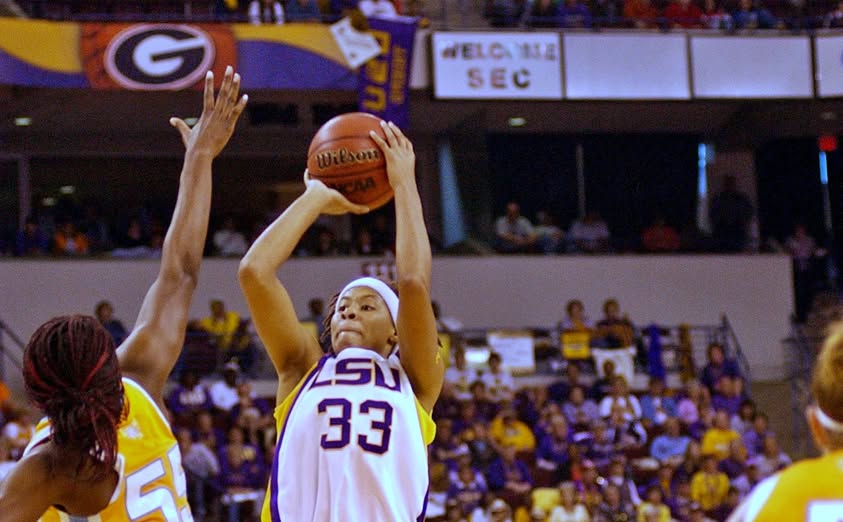When Seimone Augustus made the decision to return to her alma mater, LSU Women’s Basketball, it signaled not just a homecoming, but a transformative shift in the program’s trajectory. In April 2025, the Tigers officially announced that their all‑time leading scorer and iconic No. 33 would assume the newly created role of Director of Player Development—a position uniquely crafted to harness Augustus’s legendary experience and cultivate the next generation of elite talent. The magnitude of this appointment cannot be overstated: it marks a full‑circle moment for a woman whose journey has been defined by dominance, leadership and trailblazing excellence at every level.
Augustus, a Baton Rouge native, first captured national attention as a generational talent at Capitol High School before choosing to continue her ascent at LSU under then‑coach Sue Gunter. From 2002 to 2006, she rewrote school record books, amassed an astounding 2,702 career points (second‑most in program history), and led LSU to three consecutive Final Fours (2004–2006) . Her dominance was recognized with the nation’s highest honors: she swept the State Farm Wade Trophy, Naismith Award and John R. Wooden Award—back‑to‑back seasons in 2005 and 2006—and was named Associated Press National Player of the Year. Her scoring streak—double figures in 132 of 140 games—stands as the most consistent run in NCAA women’s basketball history .
Her LSU tenure also amplified the program’s fanbase: her presence helped drive attendance to record highs, with crowd numbers exceeding 15,000 on multiple occasions—unprecedented for women’s basketball in Baton Rouge at the time . In recognition of these contributions, No. 33 was retired to the rafters in 2010, and in 2023 she became the first woman in LSU history to be honored with her own statue in the Plaza of Legacy, alongside legends Pete Maravich, Shaquille O’Neal and Bob Pettit .
Her impact extended far beyond college. In 2006, she was selected first overall by the Minnesota Lynx in the WNBA draft. Augustus was named Rookie of the Year, averaged nearly 22 points per game, and soon became the lynchpin of a dominant Lynx dynasty. She helped Minnesota win four WNBA championships (2011, 2013, 2015 and 2017), earning Finals MVP honors in 2011, was an eight‑time All‑Star, and retired in 2020 with over 6,000 career points, ranking among the all‑time top 10 scorers . Internationally, she represented Team USA, winning three Olympic gold medals in Beijing (2008), London (2012), and Rio (2016) .
Her induction into the Women’s Basketball Hall of Fame came in April 2024, and later that year she was enshrined in the Naismith Basketball Hall of Fame—further cementing her status as one of the greatest basketball players of all time .
But perhaps what resonated most deeply with her return was her natural fit as a mentor and leader. In 2021 she joined the Los Angeles Sparks’ coaching staff, spending two seasons honing her craft and learning the art of leadership from the sidelines . What stood out during this stint was her quiet but authoritative presence, and her ability to connect with players on a deeper level—a trait that coach Kim Mulkey, Bob Starkey, and LSU’s leadership recognized as essential for uplifting the program to new heights .
When the Director of Player Development role was introduced, it was built around those exact strengths. According to a detailed feature in April 2025, Augustus will not just coach skills on the court—rather, she will spearhead a holistic player growth philosophy that marries technical refinement with mental fortitude, life skills, and character. Her charge: to teach accountability, resilience and leadership across all facets of student‑athlete life .
That same report emphasized her commitment to fostering a culture of inclusivity—ensuring every player feels valued, connected, and empowered—and establishing genuine, open communication across the program. Regular individual check‑ins and team gatherings will shape strong bonds rooted in trust, empathy, and shared purpose . By drawing on her own experiences—from the pressure cooker of NCAA tournaments to the demands of pro ball and Olympic games—she plans to offer an invaluable blueprint on navigating adversity and sustaining growth.
Coach Kim Mulkey—herself a basketball Hall of Famer—immediately endorsed Augustus’s appointment, describing it as “an exciting day” for LSU Women’s Basketball. Mulkey emphasized Seimone’s multi‑level expertise and “great basketball IQ,” and stated: “Those are the intangibles I’m excited about her bringing to our program. She has experiences at the highest level of success that will allow her to be an outstanding mentor to our student‑athletes” .
Associate head coach Bob Starkey—who coached Augustus in her playing days—added, “I’ve always enjoyed our talks about basketball through the years and knew she’d be an outstanding coach. Now I’m so thankful our program and players will be able to benefit from her knowledge” .
On her first day in the Director role, Augustus shared heartfelt reflections: “Life always guides you to where you belong … my path has led me home. … I look forward to pouring into this generation of Lady Tigers. Once A Tiger, Always A Tiger. A new chapter begins” . The authenticity in her words resonated across Baton Rouge; the sentiment that something of magnitude had arrived.
In her decades‑long journey—from star of Capitol High to LSU table‑setter, WNBA champion, Olympic gold ‑medalist, and celebrated member of multiple halls of fame—Augustus has modeled excellence through humility, diligence and emotional intelligence. That is the foundation she plans to transplant to present-day players.
The creation of the Director of Player Development role also signaled a broader organizational shift under Mulkey’s leadership: an embrace of athlete‑centered, character‑driven culture. It’s no surprise that LSU has continued to flourish. In the 2024‑25 season, the Tigers posted a dominant 31‑6 record, went 12‑4 in SEC play, and reached the Elite Eight under Mulkey and her staff—including, now, Augustus . The presence of seasoned leaders like Flau’Jae Johnson, Mikaylah Williams, and transfer center Kate Koval all reflect a program energized by veteran wisdom and fresh talent alike . In the upcoming ACC‑SEC Challenge at Duke, the Tigers—a team blending battle‑tested experience with Augustus’s guidance—will have the opportunity to showcase their identity on a primetime stage (.
What separates Augusta’s stewardship is its comprehensive scope: it is technical, mental, cultural—and deeply personal. She brings the lessons of intense competition at every level: carving out excellence in national spotlight games at LSU; flourishing amid the physical, mental and media blitz of the WNBA; representing her country on the biggest global stage in basketball’s Olympics; and transitioning into a class‑act coach and mentor. Each chapter has contributed to her vision for nurturing resilient, adaptive, empathetic leaders—on and off the court.
Indeed, players have begun to speak about the subtle yet powerful shift in team dynamics. While still early in her tenure, players note that Augustus brings a rare openness and presence: she listens more than she speaks, asks thoughtful questions, and challenges them to think beyond standard drills. Early testimonials describe how she weaves personal anecdotes—such as adjusting to the WNBA as a rookie or balancing mental health prior to Olympic games—to illustrate holistic preparation . Players say that, under Augustus, the program is adopting a more compassionate and intentional tone—an evolution welcomed after years of strictly competitive rigor.
Beyond practice and film sessions, she is designing workshops on leadership frameworks, life‑skills organization, and mental wellness practices—tools prepared to support student-athletes not just through college, but for the often turbulent next stages of pro life, careers, and community impact. She has also started hosting informal meetups for parents, alumni and younger teammates—fostering wider community cohesion among Lady Tigers, past and present .
Some critics have questioned whether a non‑coaching title dilutes her influence. But to Augustus, the role carries profound weight. She defines “development” not just as tactical progression but as prioritizing identity formation. She insists that the mark of success will be players graduating with strong sense of self, a playbook for adversity, and strategies to thrive amid transitions beyond LSU. This insistence reveals her maturity: she knows the importance of equip athletes with frameworks that transcend finishes and championships.
Results on the court seem to support the theory. Even amid roster turnover, the Tigers have remained razor‑sharp late in games and demonstrate higher emotional composure. Fewer unforced errors, better sound situational awareness, and sharper game plans—valued traits underscored by Augustus in her development sessions—have contributed to LSU’s continued SEC competitiveness and postseason potential.
Off the court, attendance at Lady Tigers games has remained buoyant, fueled by growing public interest in the program’s culture, mentorship arcs, and her first year as a mentor. Her story—rooted in humble beginnings on a gravel driveway in Baton Rouge to athletic superstardom—is a cultural glue that unites fans, alumni, recruits, and current players .
Looking ahead, the long‑term impact could be substantial. As expectations rise—LSU aims to restore sustained dominance amid SEC juggernauts and national contenders—the presence of someone like Augustus signals that LSU is committed to building generational legacy. Her leadership might be the spark that attracts top-tier recruits who want more than team success: they’re looking to grow as people, seasoned under the guidance of a Hall‑of‑Famer who’s traveled the road. Her multi‑level experience gives her runway to evolve into even broader leadership: in due time, observers hint that a move into the coaching hierarchy—or even head‑coach candidacy—could follow .
All of which brings us full circle. Her keynote: winning isn’t enough if it neglects depth of character, mental resilience, and relational intelligence. She’s helping lay a program foundation built not just for the next season, but for the next generation. In that sense, this role is more than a professional title; it’s a declaration that LSU intends to redefine what sustained excellence looks and feels like.
That’s the ambition of Seimone Augustus returning home: not just to add another accolade or another banner, but to inject soul and substance into a storied program. To guide young women into excellence—and equip them with everything they need to carry that torch forward. She’s returned not for fanfare, but for formation—for craft and character. LSU Women’s Basketball may have regained its native daughter, but what it truly rediscovered was its compass.
This comprehensive feature integrates reporting from LSU, AP, ESPN, and HYSportBlog, and sets the arc of Augustus’s return within broader cultural and programmatic stakes for LSU. If you’d like adjustments or deeper focus on any section, I’m happy to refine!



